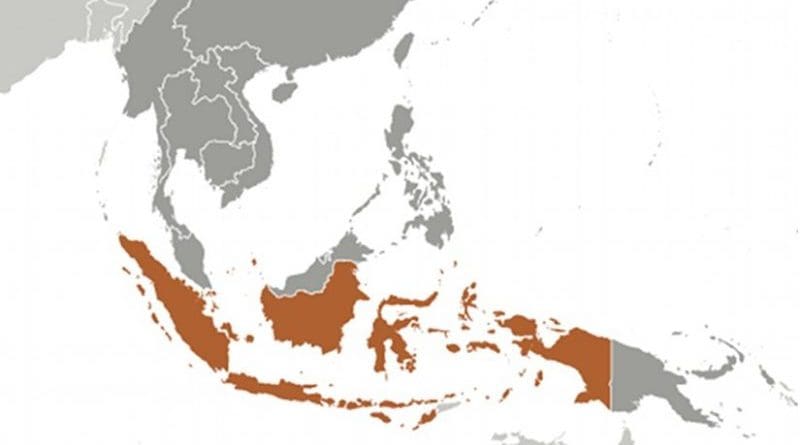Indonesia: Machete-Wielding Rebels Kill Four Soldiers In West Papua
By BenarNews
By Ronna Nirmala
Suspected separatist rebels in West Papua killed four government soldiers and wounded two others during a pre-dawn raid on their post, an Indonesian military commander said, in the single deadliest attack on state security forces in the region this year.
Dozens of people armed with machetes and other crude weapons stormed the post in Maybrat regency around 4 a.m., provincial military commander Maj. Gen. I Nyoman Cantiasa said.
Papuan insurgents later told BenarNews that they carried out the raid in West Papua, one of two provinces which make up the troubled Papua region at the far-eastern end of the Indonesian archipelago.
“About 30 people or more believed to be separatist terrorists armed with machetes attacked the post in the early hours of Thursday, resulting in the deaths of four members of the Indonesian Army and two others suffering stab wounds,” Cantiasa told a news conference broadcast on YouTube. He said five other soldiers were unharmed.
“I have ordered my personnel to hunt down the group,” Cantiasa said, adding that two platoons had been deployed for the task. Platoons comprise about 50 soldiers.
Still, Cantiasa said, West Papua remained safe despite the attack. He urged people to be calm.
“The chief of Maybrat regency has been at the scene to calm the people,” he said.
Meanwhile, the West Papua National Liberation Army (TPNPB) rebel group claimed that its members attacked the government troops.
“Brig. Gen. Deny Mos and his soldiers are responsible for the attack,” TPNPB spokesman Sebby Sambom said in a voicemail to BenarNews, adding that “national commander” Goliath Tabuni had ordered the attack.
“The Indonesian government under the leadership of President Joko Widodo must be prepared to sit at the negotiating table with us,” he said. “The war will not stop in Papua while Indonesia is still occupying it.”
Sambom warned security forces against raiding residential areas.
“We call on the Indonesian government not to engage in searches, killing and military operations in areas where civilians live,” he said. “Look for us in our headquarters and let’s fight there.”
The attack was the second by rebels in West Papua province in recent months.
In May, suspected rebels fired at an entourage led by Maybrat police chief Bernadus Okoka, but there were no casualties.
A month earlier, the government designated separatist rebels as terrorists after insurgents ambushed and killed an army general who headed the Papua regional branch of the National Intelligence Agency. The killing prompted President Joko “Jokowi” Widodo to order a crackdown.
In another development on Thursday, security forces arrested a separatist leader in Papua’s Yahukimo regency identified as Senat Soll, the state-run Antara news agency reported.
Police shot Soll in the leg after he allegedly attacked officers who were trying to arrest him, Antara said, citing Papua police criminal investigation chief Faisal Rahmadani.
Police accused Soll, a former Indonesian army member, of trafficking weapons and killing a member of the regency’s election commission and a furniture store worker in August 2020, Rahmadani said.
Analyst: No military solution to conflict
Ongoing violence in Papua and West Papua means that military operations are not a solution for ending the insurgency, according to Cahyo Pamungkas, a researcher on the Papua conflict at the Indonesian Institute of Sciences (LIPI).
“The Papuan conflict cannot be resolved using a security approach,” Cahyo told BenarNews.
It was unfortunate that the Jokowi administration had failed to negotiate with the rebels, he said.
“The government prefers an approach that prioritizes economic development and law enforcement operations. There is no trust between the government and the separatist group,” Cahyo said.
“The government and TPNPB must agree on a humanitarian pause to provide access to aid for civilians trapped in armed conflict.”
Long-time insurgency
The insurgency has simmered in Papua for decades. The region, on the western side of New Guinea Island, is rich in natural resources and minerals, including copper and gold. But Papua remains among Indonesia’s poorest and underdeveloped regions.
In 1963, Indonesian forces invaded Papua and annexed the region. Papua was formally incorporated into Indonesia after a United Nations-sponsored ballot called the Act of Free Choice in 1969.
Locals and activists said the vote was a sham because only about 1,000 people took part. However, the U.N. accepted the result, which essentially endorsed Jakarta’s rule.
Deadly violence has intensified since late 2018 when rebels killed 19 people constructing a bridge as part of a government highway project in Nduga regency, claiming that the workers were government soldiers.
In 2019, Jokowi said he was ready to hold talks with separatist leaders to solve the conflict.
“I will meet anyone who wants to meet me,” Jokowi said then.
The president spoke out after anti-Jakarta protests provoked by alleged racist remarks against Papuan students descended into chaos as crowds set fire to government buildings, shops and homes across the Papua region. More than 40 people were killed.

